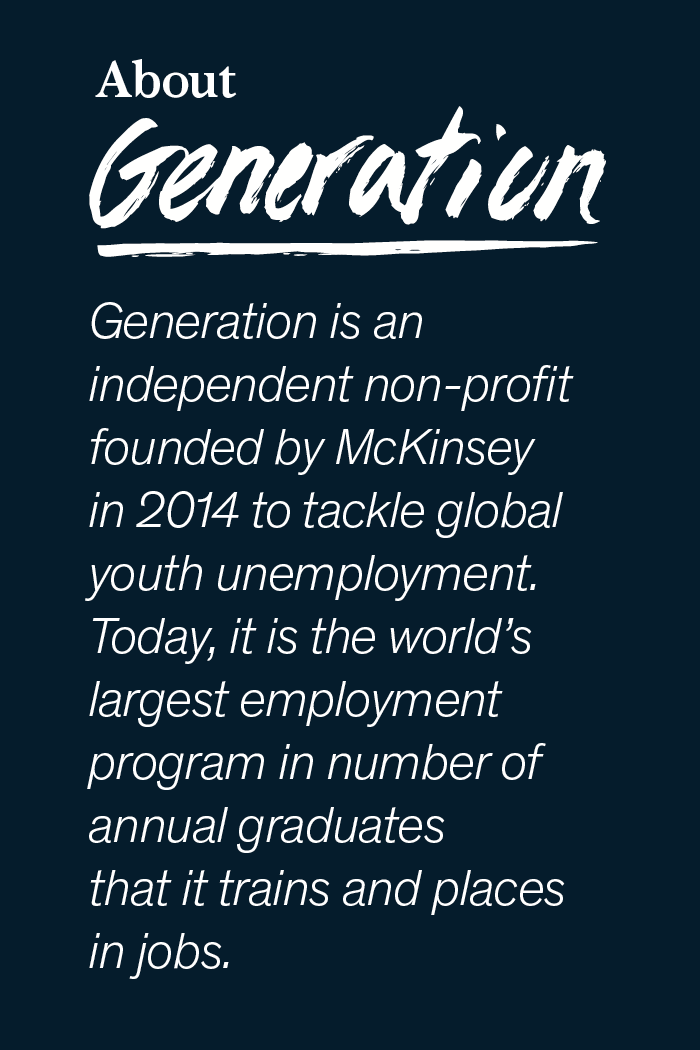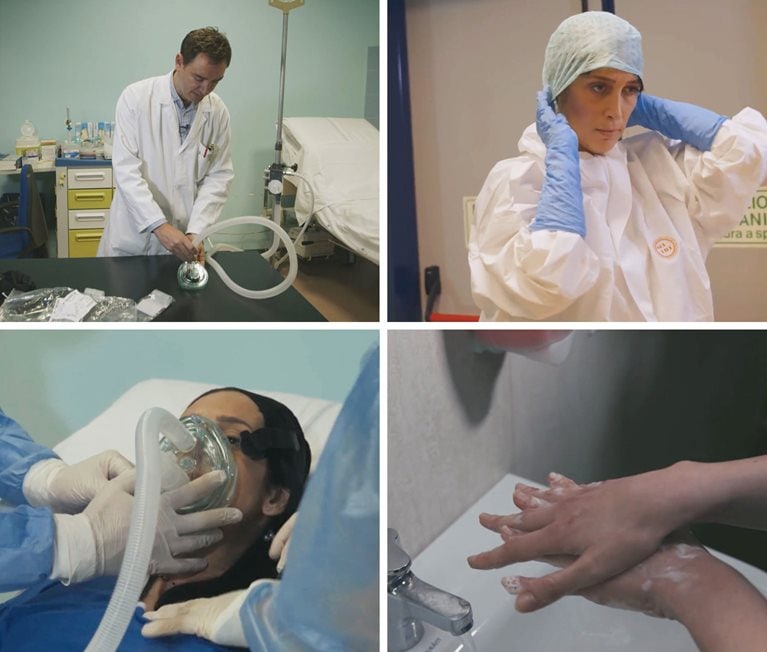Since 2018, Generation Italy has trained young people for careers that include working in Java development, hospitality, and sales at boutiques and stores. The program has grown from two to five cities and graduated 800 students, with 80 percent of them placed in jobs.
But this January, the coronavirus arrived in Italy and changed everything. In a matter of days, the northern part of the country succumbed to the pandemic, becoming for a time the epicenter of the outbreak in the Western world. Hospitals filled to capacity, while businesses, stores, hotels, and restaurants closed. Generation shut down its operations and classes in Milan, Rome, Naples, and Turin and moved all of its programming online.

Oscar Pasquali, COO of Generation Italy, recalls the sense of urgency the team had around the early days of the outbreak. “We wanted to help the healthcare system, so we talked to several hospitals. While we knew we could not actually train nurses, we could provide some skills development,” he says. “What we heard again and again is that the severe respiratory problems created by COVID-19 had dramatically increased the need for nurses with experience in procedures normally used in intensive care units. To cope with the surge in infected patients, hospitals were forced to deploy all nursing and medical staff, including those who were not necessarily familiar with these practices.”
The Generation team mobilized, forming a coalition of partners, to develop a demonstration-based online course that showcases the expertise of medical experts. Gruppo San Donato and University Vita-salute San Raffaele, a prominent healthcare group in Italy, provided medical staff who feature in the course’s videos; Sky Italia filmed and produced the lessons; and Intesa Sanpaolo helped with the creation of the e-learning modules.
The eight-hour online course includes 35 short video lessons—three to seven minutes each—with practical demonstrations and quizzes to assess learning. Developed and produced in three weeks, the course focuses on teaching nurses how to protect themselves and patients using appropriate personal protective equipment; how to perform and monitor non-invasive ventilation techniques; and how to manage stress in a crisis situation.

“We did the filming at San Raffaele hospital in two days, and I was struck by the commitment and strength of the two nurses and anesthetist who helped us,” remembers Oscar. “They were working shifts at the same time. One came in to film her part after a 14-hour night shift; she had no break or rest. Without them, we couldn’t have done the program. They really wanted to share what they had learned to help other nurses.”
“To make the program available to as many nurses as possible,” Oscar adds, “we worked with the National Federation of Orders of Nursing Professions to get it accredited by the Ministry of Health and publish the program on their website.” It is offered at no charge, and grants continuing education credits to qualified participants.
In feedback on the program, 80 percent of participating nurses say the course was immediately relevant to their work and 93 percent say the quality of the course was excellent or very good.
I was struck by the commitment and strength of the two nurses and anesthetist who helped us. One filmed her part after a 14-hour night shift; she had no break or rest. Without them, we couldn’t have done the program.
Several participants remarked on how helpful it is to have demonstration videos, which are not usually a component of nurses’ training. In particular, the content on the non-invasive ventilation and stress management has been especially well received; one nurse commented that “she hadn’t been able to find that anywhere else,” while another noted: “All of the healthcare professionals who participated…were professional, exhaustive and clear in their explanations.”
As of today, more than 52,000 nurses have enrolled in the course—about 12 percent of all nurses in Italy—80 percent of whom have completed the course and passed the assessment, gaining continuing education credits. Two weeks ago, in collaboration with the National Federation of Orders of Doctors and Dentists, the course was extended to doctors and dentists. Twelve thousand of them have enrolled, and 75 percent of those have completed and passed the course.
Generation has recently launched similar programs in Mexico, India, and Spain, building on Italy’s success. For example, in Mexico, the program is being rolled out to more than 100,000 nonclinical staff across more than 270 hospitals. In India, more than 4,400 nurses registered in the first four days of the program which is rolling out to more than 1,200 hospitals to start. And in Spain, more than 10,000 nurses have pre-registered for the course.
“In the wake of the pandemic, Generation wanted to help our communities,” says Mona Mourshed, CEO of Generation. “So we took our curriculum and learning assets and applied them to supporting healthcare workers to treat and care for COVID-19 patients, and to take care of themselves in the process.”